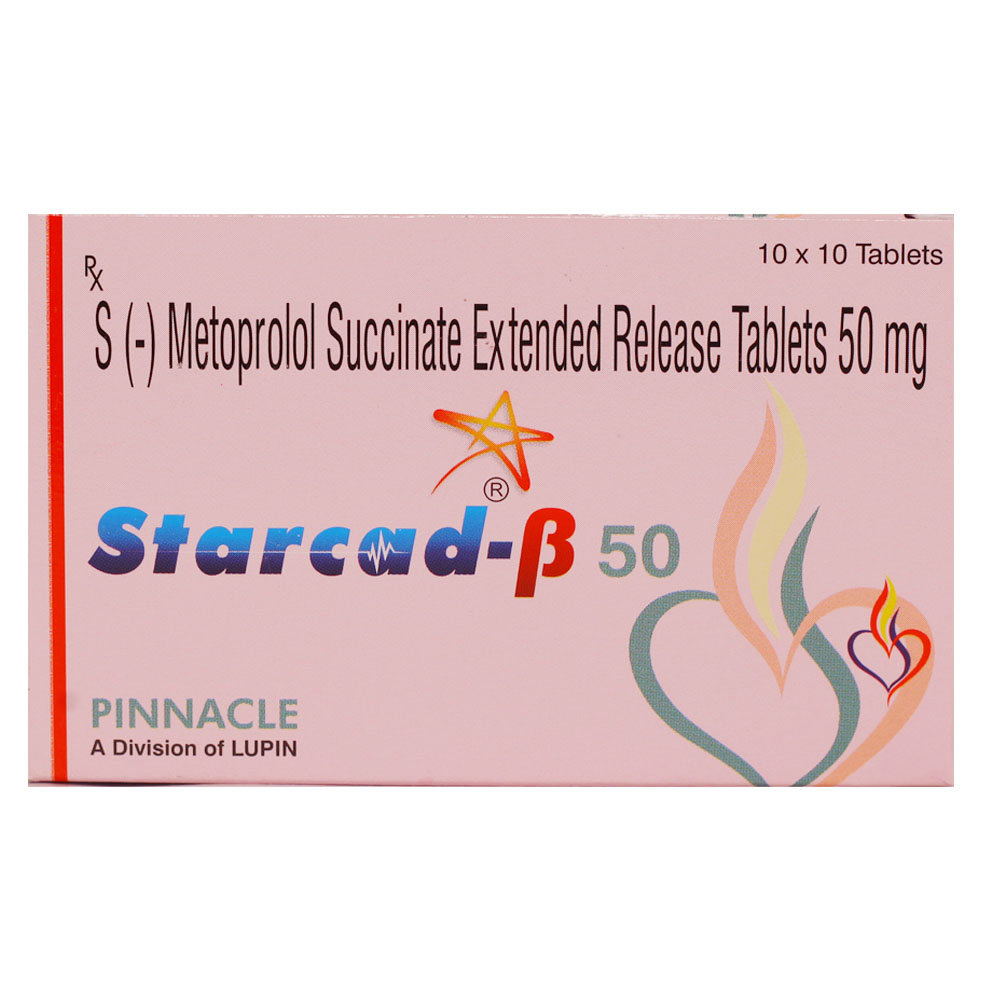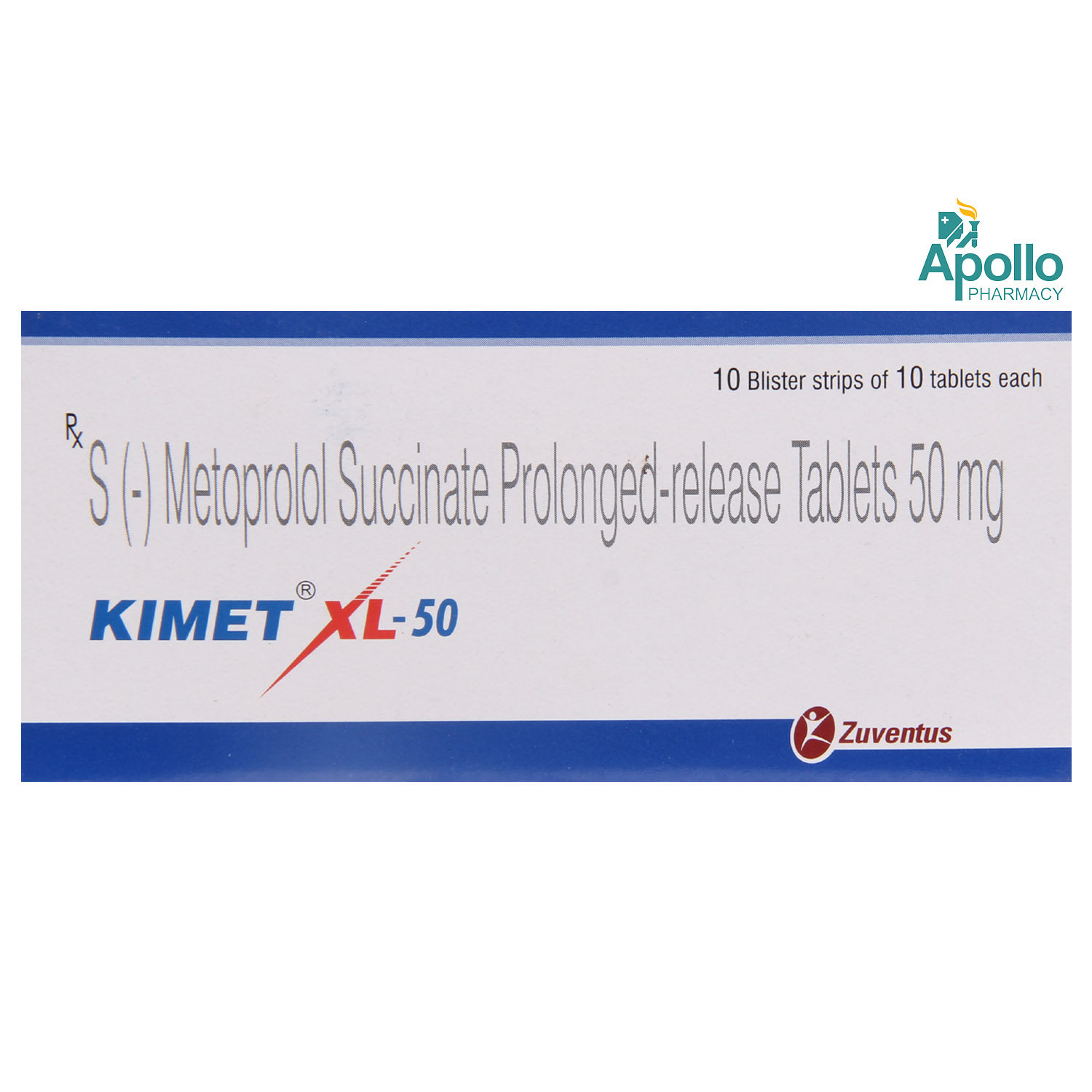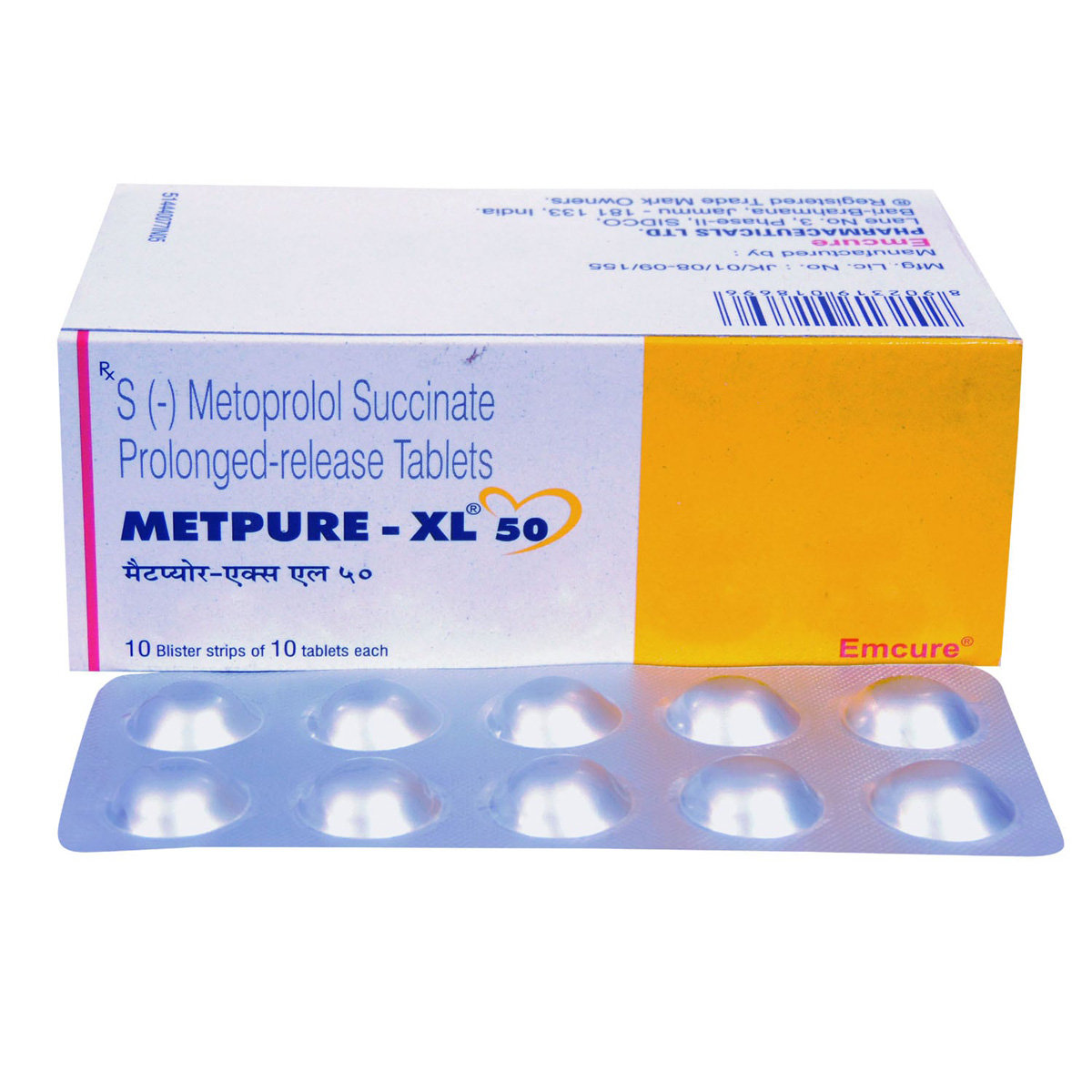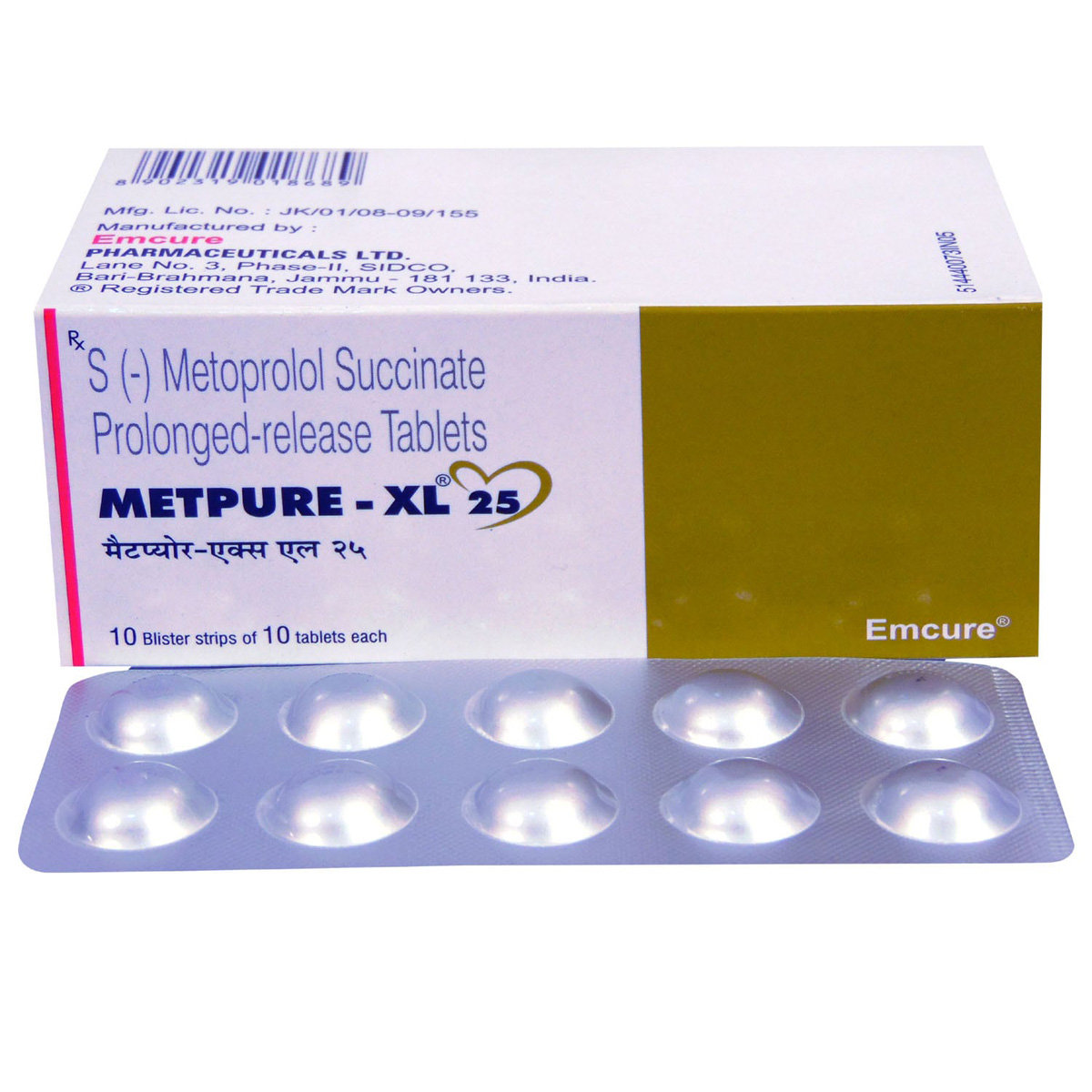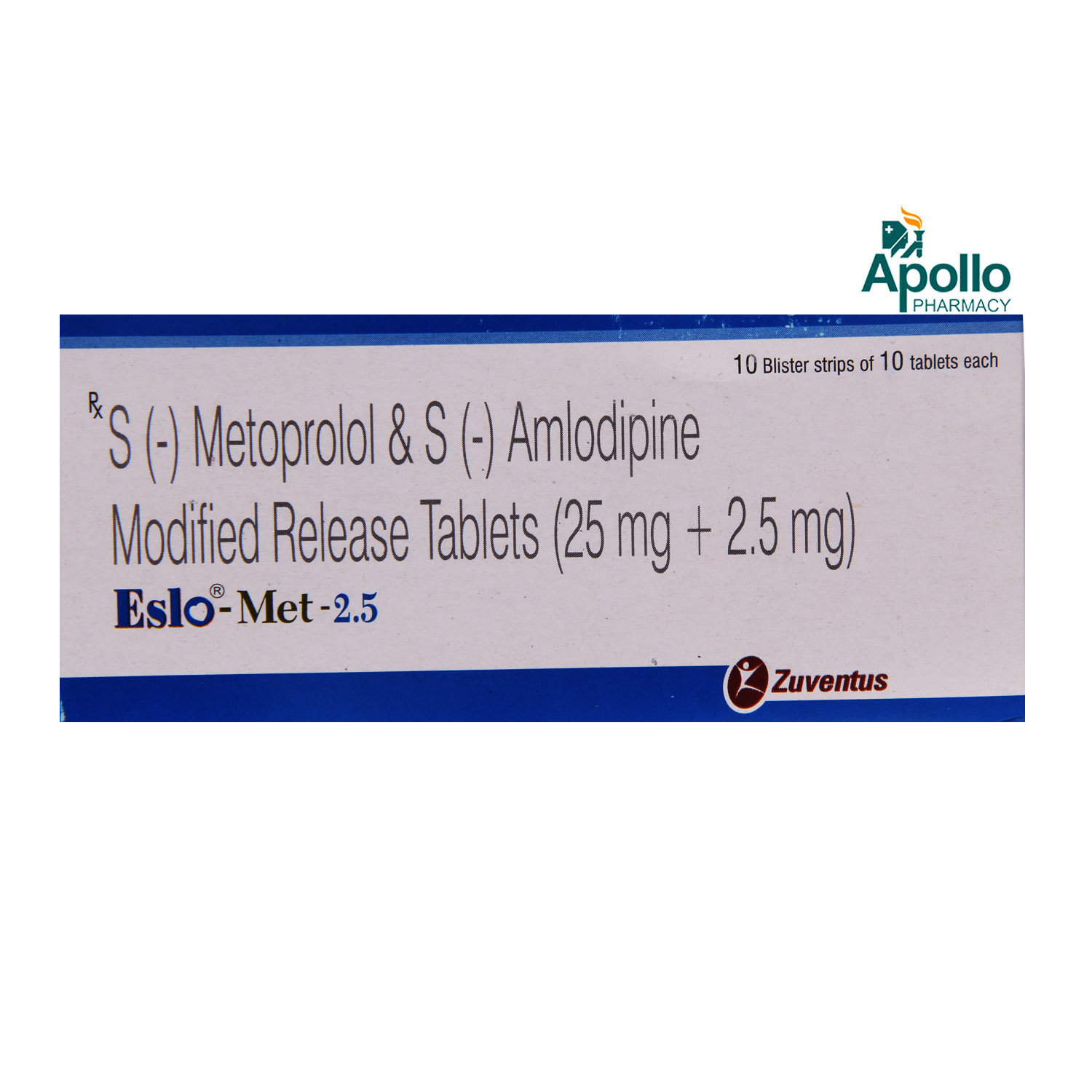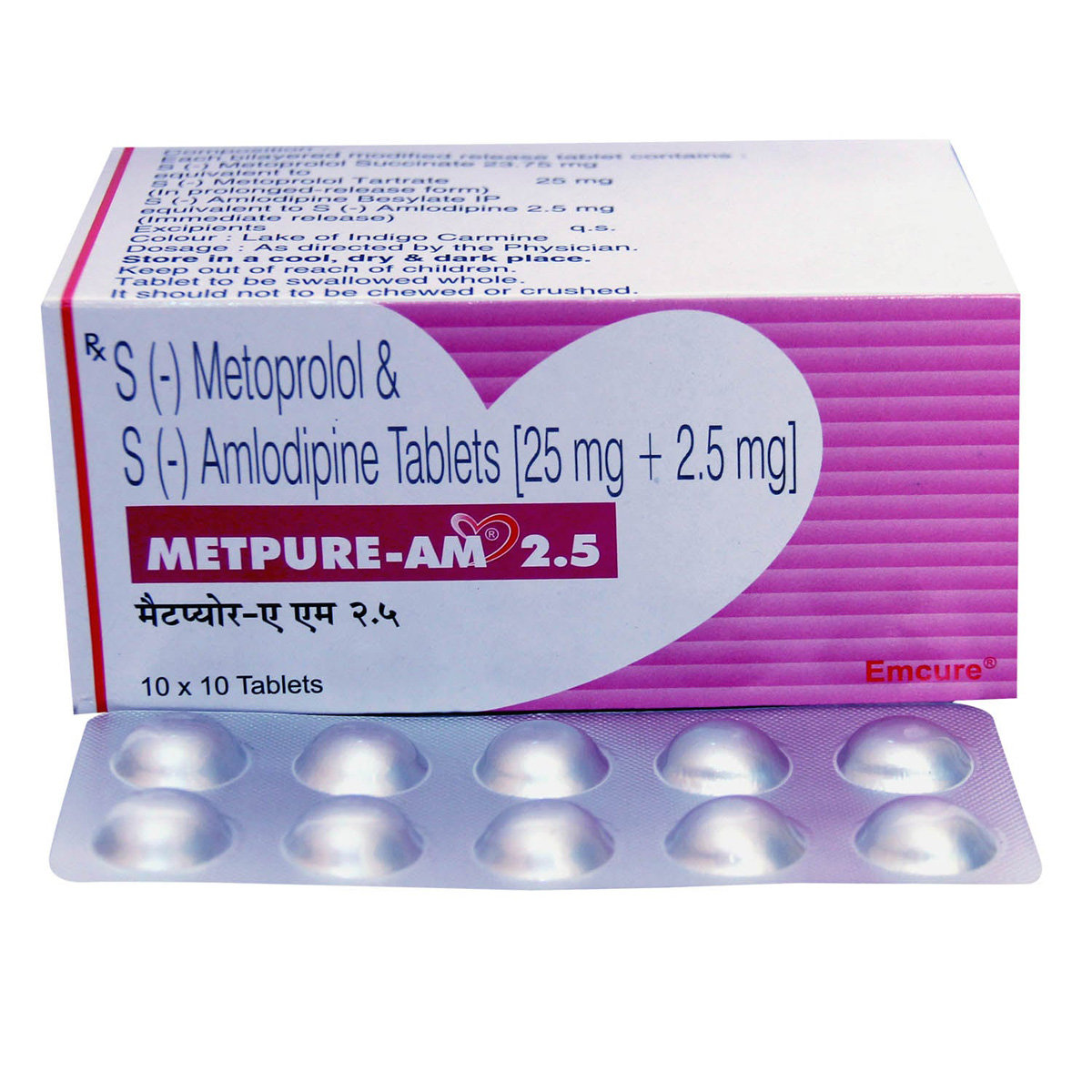S Metoprolol Succinate
About S Metoprolol Succinate
S Metoprolol Succinate is used alone or together with other medicines to treat high blood pressure (hypertension), heart-related chest pain (angina), and heart rhythm disorder (arrhythmia). Besides this, it also helps in relieving symptoms of migraine-related headaches.
S Metoprolol Succinate contains S-Metoprolol Succinate, which works by blocking the action of certain natural substances in your body. It helps slow down the heart rate, making it easier to pump more blood around your body.
In some cases, you may experience side effects such as headache, fatigue, nausea, vomiting, stomach upset, diarrhoea or constipation, abdominal pain, numbness, and cold extremities. If the side effects are persistent, reach out to your doctor.
Do not take S Metoprolol Succinate if you are allergic to any of its components. Consult your doctor if you are pregnant or breastfeeding. Keep your doctor informed about your health condition and medications to prevent any interactions.
Uses of S Metoprolol Succinate
Medicinal Benefits
- S Metoprolol Succinate contains S-Metoprolol Succinate, a beta-blocker used for blood pressure management.
- It treats high blood pressure (hypertension) by reducing the workload on the heart.
- It also helps manage chest pain (angina) and irregular heart rhythms (arrhythmia).
- It slows down the heart rate, making it easier for the heart to pump blood effectively.
- S Metoprolol Succinate lowers blood pressure and reduces the risk of stroke, heart attack, and other cardiovascular or kidney problems.
- It may also help relieve migraine-related headaches by improving blood flow and reducing stress on blood vessels.
Directions for Use
- Take S Metoprolol Succinate with or without food or as advised by the doctor.
- Generally, it is advised to take it once a day or follow your doctor's instructions on the dosage and timing of this medication to have optimal results.
- Swallow S Metoprolol Succinate as a whole with a glass of water.
- Do not crush, chew, or break it.
Storage
Side Effects of S Metoprolol Succinate
- Headache
- Fatigue
- Nausea
- Vomiting
- Stomach upset
- Diarrhoea
- Constipation
- Abdominal pain
- Numbness
- Cold extremities
- Slow heart rate
- Breathlessness
Drug Warnings
- Do not take S Metoprolol Succinate if you are allergic (hypersensitive) to any of its ingredients.
- Please consult your doctor before taking S Metoprolol Succinate if you are pregnant or planning to conceive and breastfeed.
- It should not be given to children less than 12 years of age.
- You should not use the S Metoprolol Succinate if you have a very slow heartbeat, a serious lung condition (like asthma), a serious heart condition (sick sinus syndrome), or a heart blockage.
- Before taking this medicine, you should tell the doctor if you have any muscle disorder (myasthenia gravis, rhabdomyolysis), breathing problems (COPD, bronchitis, emphysema), low blood sugar level (hypoglycemia) or low blood pressure (hypotension).
- Inform your doctor if you have depression, previous heart failure, liver/kidney disease, thyroid hormone disorder like overactive thyroid (hyperthyroidism), adrenal gland cancer, or severe blood circulation problem (Raynaud's syndrome).
- Let your doctor know if you are taking any other medicines.
Drug Interactions
Drug-Drug Interactions: S Metoprolol Succinate may interact with antihypertensive agents (clonidine, diltiazem), cancer medications (ceritinib, dolasetron), medicines used to treat irregular heartbeat (disopyramide, verapamil), medicines used to sleeping sickness (fexinidazole), medicines used to treat multiple sclerosis (fingolimod, siponimod, tizanidine), HIV medications (atazanavir, saquinavir), medicines used to diagnose bronchial hyperreactivity (methacholine), bronchodilators (oxtriphylline), medicines used to stop premature labour (ritodrine) and medicines used to treat asthma (theophylline, aminophylline, dyphylline).
Drug-Food Interactions: Avoid consumption of alcoholic beverages and potassium-rich foods.
Drug-Disease Interactions: S Metoprolol Succinate may interact with disease conditions, including bradyarrhythmia/AV block, cardiogenic shock/hypotension, CHF (Congestive heart failure), diabetes, haemodialysis, hypersensitivity, ischemic heart disease, PVD (Peripheral vascular disease) and liver disease.
Drug-Drug Interactions Checker List:
Safety Advice

Alcohol
cautionDrinking alcohol may increase tiredness and lower blood pressure causing dizziness or drowsiness. So avoid consuming alcohol with S Metoprolol Succinate.

Pregnancy
cautionIn pregnant women, no adequate and well-controlled studies exist. S Metoprolol Succinate should be used only when necessary during pregnancy. Your doctor will weigh the benefits and potential risks before prescribing S Metoprolol Succinate.

Breast Feeding
cautionSmall amounts of S Metoprolol Succinate pass into the breast milk and do not cause any problems for your baby. However, if you are breastfeeding, contact your doctor before taking S Metoprolol Succinate.

Driving
cautionYou may experience dizziness, tiredness, or blurred vision while taking S Metoprolol Succinate. So, it is not recommended to drive, use machinery, or perform other tasks.

Liver
cautionS Metoprolol Succinate to be taken with caution if you have pre-existing or a history of liver disease/conditions. Your doctor may adjust the dose based on your condition.

Kidney
safe if prescribedS Metoprolol Succinate is probably safe to use in patients with kidney disease. Please consult your doctor before using S Metoprolol Succinate.

Children
unsafeThe safety and efficacy of S Metoprolol Succinate in children have not been established. Hence, S Metoprolol Succinate is not recommended for children.
Habit Forming
Diet & Lifestyle Advise
- Keep your weight under control with a BMI of 19.5-24.9.
- Do regular physical activity or exercise for at least 150 minutes per week, or about 30 minutes most days of the week.
- Doing this can help lower your raised blood pressure by about 5 mm Hg.
- Option for a diet rich in whole grains, fruits, veggies, and low-fat dairy products.
- Limit sodium chloride (table salt) intake in your daily diet to 2300 mg per day or less than 1500 mg is ideal for most adults.
- If you are taking alcohol, only one serving for women and two servings for men is advisable.
- Quitting smoking is the best strategy to lower the risk of heart disease.
- Avoid chronic stress, as it can raise your blood pressure. Try to enjoy and spend time with your loved ones to cope with stress and practice mindfulness techniques.
- Monitor your blood pressure daily, and if there is too much fluctuation, immediately contact your doctor.
- Try to include heart-healthy omega-3 fatty acid-containing food drinks in your daily diet. You can also use low-fat cooking oil like olive oil, soybean oil, canola oil, and coconut oil can help lower your elevated blood pressure.
Special Advise
- S Metoprolol Succinate can hide symptoms of low blood sugar if you are diabetic. Monitor your blood sugar levels regularly.
- Do not stop taking S Metoprolol Succinate suddenly, as it can cause your blood pressure to rise suddenly, thereby increasing the risk of heart attack and stroke.
Patients Concern
Disease/Condition Glossary
Hypertension: High blood pressure is a chronic condition when the blood pressure and the heart's workload are too high. This condition can lead to hardened arteries (blood vessels), decreasing the blood and oxygen flow to the heart. Raised blood pressure can cause chest pain (angina) and a heart attack (when the blood supply to the heart is blocked). Additionally, high blood pressure also causes brain damage (stroke) and kidney failure.
Angina Pectoris: Discomfort in the chest or the heart is referred to as angina. It occurs when the workload on the heart increases, and the heart does not get as much blood as it needs. Symptoms of angina include chest tightness, pressure and heaviness in the chest.
Arrhythmia: Arrhythmia is a condition with the rate at which the heart beats. In this condition, the heart beats too quickly, too slowly, or at an irregular rate. It can cause significant heart damage. A cardiac arrhythmia develops when there are irregular electrical signals in the heart. Tachycardia occurs when the heart beats too quickly, while bradycardia occurs when it beats too slowly. Arrhythmia treatment involves medicines, medical treatments, implanted devices, and, in certain cases, surgery.
Heart failure: Heart failure is a chronic disorder in which the heart's ability to pump blood is impaired. Heart failure can arise as a result of disorders such as excessive blood pressure, heart muscle enlargement or injury, defective heart valves, or restricted arteries in the heart. Shortness of breath, weariness, a rapid heartbeat, and swollen legs are all symptoms of heart failure.
Stroke: A stroke is a potentially fatal medical illness that occurs when the blood flow to a portion of the brain is cut off. Strokes are a medical emergency that requires immediate treatment. The brain, like all organs, needs the oxygen and nutrients delivered by the blood to function correctly. Brain cells begin to die when the blood supply is reduced or terminated. This can result in brain injury, incapacity, and even death.
Migraine: A migraine headache is typically characterised by intense pain on one side of the brain. Many patients also have symptoms such as nausea, vomiting, and heightened sensitivity to light or sound. Some people suffer from migraines on a regular basis, up to several times per week. Others only get migraines on occasion. It is possible to go years without having a migraine attack. Migraines can have a negative impact on your quality of life and prevent you from carrying out your typical daily activities.
FAQs
S Metoprolol Succinate is used to treat high blood pressure (hypertension), heart-related chest pain (angina), and heart rhythm disorder (arrhythmia). Besides this, it also helps in relieving symptoms of migraine-related headaches.
S Metoprolol Succinate contains S-Metoprolol Succinate, which helps to reduce blood pressure by allowing the blood to flow more smoothly.
Use of S Metoprolol Succinate in diabetes may mask tachycardia (fast heart rate) occurring with low blood sugar level, but other symptoms like dizziness and sweating may not be significantly affected. So, if you are a diabetic patient, always consult a doctor before taking S Metoprolol Succinate.
Serum sodium, serum potassium, white blood cells, and kidney or renal function should be closely monitored before taking S Metoprolol Succinate.
It is advised to continue your medicine even after your blood pressure is under control or becomes normal, as blood pressure can shoot up at any time. If you have any discomfort, please consult your doctor immediately.
S Metoprolol Succinate can increase blood potassium levels. So a potassium-rich diet and supplements should be avoided while taking S Metoprolol Succinate to avoid any unpleasant side effects.
Stopping S Metoprolol Succinate abruptly may cause changes in your heart rhythm and blood pressure, cause chest pain, or a heart attack. Your doctor will gradually lower your dose over time to help prevent these symptoms. Please consult the doctor before stopping S Metoprolol Succinate.
S Metoprolol Succinate may cause dizziness and tiredness; drive or operate machinery only if you are alert. Drinking alcohol may increase tiredness and lower blood pressure causing dizziness or drowsiness. So, avoid consuming alcohol with S Metoprolol Succinate. Orthostatic hypotension (sudden lowering of blood pressure while standing) might occur, so patients using S Metoprolol Succinate should get up with caution.
Let the doctor know if you have very slow heartbeat, asthma, serious heart condition (sick sinus syndrome), or any heart blockage. Consult the doctor if you are pregnant or breastfeeding.
S Metoprolol Succinate starts working within 1 hour. However, it might take a week to take full effect.
No, it is safe to take S Metoprolol Succinate if prescribed by the doctor. Take it in the dose and duration prescribed by the doctor.
S Metoprolol Succinate does not help you sleep better. It is used to treat hypertension (high blood pressure), angina (heart-related chest pain), arrhythmia (heart rhythm disorder), heart failure, stroke, and migraine.
Drinking alcohol may increase tiredness and lower blood pressure causing dizziness or drowsiness. So, avoid consuming alcohol with S Metoprolol Succinate.
S Metoprolol Succinate may cause side effects such as headache, fatigue, nausea, vomiting, stomach upset, diarrhoea or constipation, abdominal pain, numbness, and cold extremities. Most of these side effects of S Metoprolol Succinate do not require medical attention and gradually resolve over time. However, if the side effects are persistent, reach out to your doctor. However, you are advised to talk to your doctor if you experience these side effects persistently.

